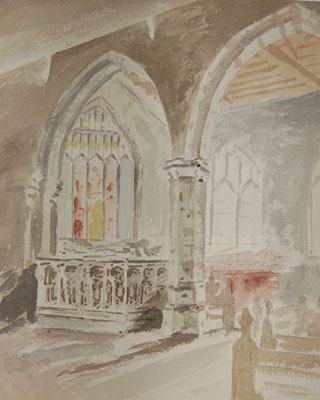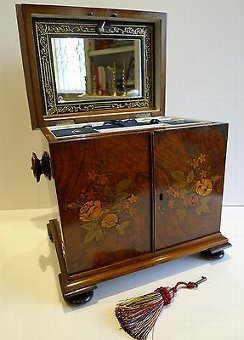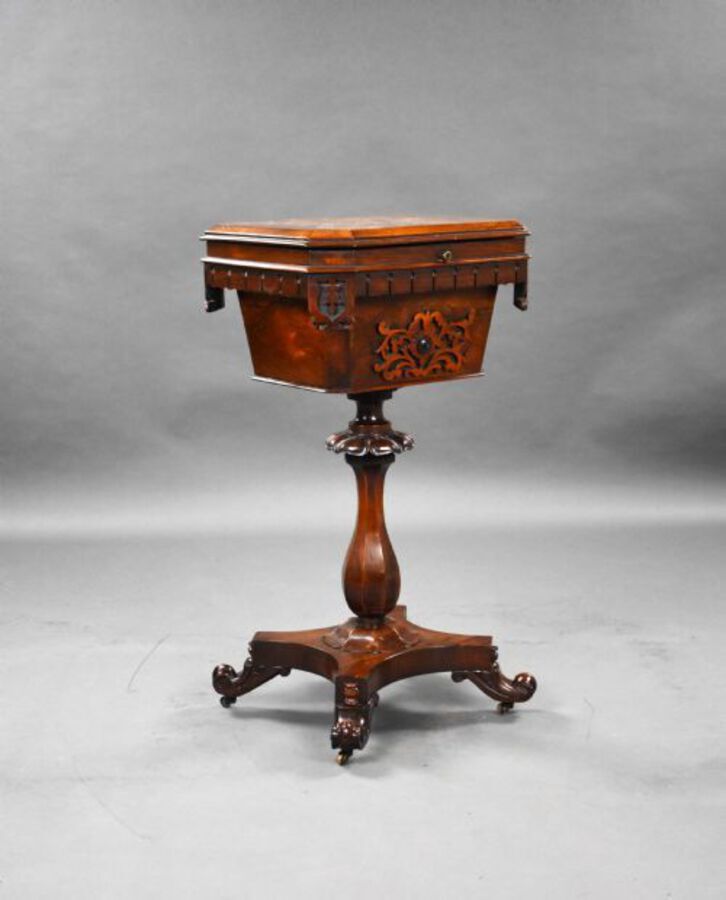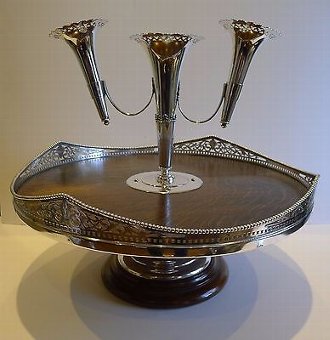An unusual 1930''s Japanese lacquered tie press in original condition. Measures 10.5 x 5.5 inches, 27 x 14 cms. A plaque on the reverse reads "Royal Arsenal Co-Operative Society Ltd., Complete Outfitters, Woolwich & Branches"
The Royal Arsenal Co-operative Society (RACS) was a consumer co-operative based in south east London; taking its name from the royal munitions works (Royal Arsenal) at Woolwich.
Initially established in 1868 as the Royal Arsenal Supply Association by 20 workers from the Royal Arsenal, the society renamed itself Royal Arsenal Co-operative Society in 1872. In the century that followed, the society''s activities expanded from food retail into a huge range of commercial, social & political activities. Having begun operations from a room of a house in Plumstead, by its height the society had outlets across most of South London and parts of Hampshire, Berkshire, Kent, Surrey and Sussex. Membership rose to 500,000 and sales exceeded £60million. Yet by 1985 its commercial problems were such that it merged into the national Co-operative Wholesale Society.
The RACS ran not just food shops (a founding aim of the UK consumer co-operative movement being the provision of cheap unadulterated food) but also milk, bread & fuel deliveries, department stores, a bookshop, jewellery department, shoe shops and chemists. Other services included removals, catering, undertakers (customers included Herbert Morrison), hairdressers, laundry, a travel agency, insurance & savings clubs. As was usual for such co-operative societies, members were paid a dividend in proportion to their spending with the society – at one point in embossed tin tokens, later by the quoting of a "Divi Number", towards the end by stamps.
To support its retail activities the RACS established bakeries, bought farms & piggeries and built food processing factories. It owned stables & railway wagons, an abbatoir, dairy, a frozen food plant, a fleet of coaches and two hotels on the Isle of Wight.
From 1878 onwards 2.5% of the society''s profits were spent on education. The RACS had an Education Department, ran classes and sports days, opened reading rooms, supported the Woodcraft Folk & the Co-operative Women''s Guild, youth clubs at Falconwood and Coldharbour, a cricket club, orchestras and at one point two choirs conducted by (Sir) Michael Tippett. The society opened its first library in Woolwich in 1879 some 20 years before the local authority provided such a facility.
Perhaps surprisingly, in 1900 the RACS became a large-scale housing developer by building the Bostall Estate on its farmland in Abbey Wood – its Works Department constructing over a thousand homes. The streets still bear co-operative-theme names, such as Owenite (after Robert Owen), Commonwealth, Rochdale (after the ''Rochdale Pioneers''), McLeod and WillRose (after founder-members Alexander McCloud and William Rose). In 1925 the RACS bought the 1250-home Royal Arsenal workers estate at Well Hall in Eltham from the Government, which it then renamed the Progress Estate.
The RACS was always one of the more political co-operative societies. Its motto was "Each for All and All for Each", it employed a Political Secretary, published magazines and newspapers (such asComradeship and The Wheatsheaf) and housed Basque refugees from the Spanish Civil War (see also Milk for Spain). The RACS supported the campaign for working-class political representation (seeLabour Representation Committee) and the election of Will Crooks as MP for Woolwich. It chose to affiliate directly to the Labour Party rather than to the Co-operative Party as was more usual for such societies. As well as the usual co-op dividend to its customer-members, the RACS also paid a "bonus to labour" – for instance paying the tradesmen building the Bostall Estate a halfpenny an hour above the Trade Union rate. Overall control of the RACS rested with a full-time Management Committee elected by society members under proportional representation.By the late 1970s the RACS was in trouble. Greater customer affluence and competition from supermarket chains such as Sainsbury''s were changing the society''s market – its size & democraticownership structure made it slow to adapt. Membership numbers declined, weakening the society''s democratic basis]. Reserves dwindled and dividend payments – for many, the Co-op''s unique selling point – all but ceased] In 1985, after a century of expansion in size & scope the RACS avoided collapse by ''transferring its engagements'' to the national Co-operative Wholesale Society. Many of the former RACS supermarkets and funeral homes remain as Co-op outlets, but most of the rest is history.
Antiques.co.uk Ref: DCHP35HA
- Width (cm):
- 11
- Height (cm):
- 6
- Depth (cm):
- 0
Here on antiques co uk we love antiques and specialise in selling antiques. Even though this item was for sale and is now sold or otherwise now unavailable we have many more items for sale including vintage antiques, silver, tables, watches, jewellery and much more for your interiors and home.
Search all the antiques currently for sale on www.antiques co uk. Or why not consider selling your antiques and making sales more easily with us!

![The Arderne Tomb, St Peter's Church Elford]() £250.00
£250.00![Magnificent Antique English Marquetry Inlaid Walnut Compendium c.1820]() £2552.17
£2552.17![William IV Rosewood Tea Poy]() £1250.00
£1250.00![Rare Antique English Oak & Silver Plated Lazy Susan c.1890]() £1259.93
£1259.93












